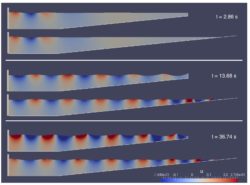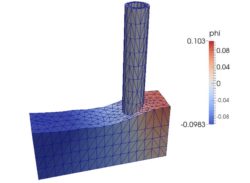Prediction of extreme water waves for maritime wave-tank experimentation
- Academic lead
- Onno Bokhove and Mark Kelmanson (Mathematics)
- Industrial lead
- Tim Bunnik and Geert Kapsenberg, Maritime Research Institute Netherlands (MARIN)
- Co-supervisor(s)
- Mark Walkley (Computing)
- Project themes
- Environmental Flows, Geophysical flows
Water-wave modeling and prediction is very important for maritime engineering, in which accurate and robust extreme wave prediction is required in target areas and for specific time intervals in order to test wave impact on maritime structures. Extreme or rogue waves are waves with rare occurrences that are at least twice as high as the surrounding ambient sea. Such maritime structures include ships, offshore platforms and offshore wind turbines [1,3]. The goal of the project is to advance existing water-wave prediction tools, verify these against test/exact solutions and validate these against wave-tank experiments. Both existing water-wave prediction tools will be extended and various advanced modeling routes can and will be pursued.

Fig. 1. Comparison between standing-wave and wave-beach simulations, the latter showing effective wave-damping at the beach, cf. [4].

Fig. 2. Numerical simulations of linear waves impacting a linear elastic beam; free surface and beam deformations, and velocity potential φ, cf. [1].
References:
[1] Salwa, Bokhove, Kelmanson 2017: Variational modelling of wave-structure interactions with and offshore wind-turbine mast. J. Eng. Maths. 107, 61-85.
[3] Kalogirou, Bokhove, Ham 2017: Modelling of nonlinear wave-buoy dynamics using constrained variational methods. ASME 2017 36th Int. Conf. on Ocean, Offshore and Arctic Eng.
[4] F. Gidel 2018: Variational water-wave models and pyramidal freak waves. PhD Thesis. Floriane Gidel was also postgraduate of the year 2017 in Leeds.
